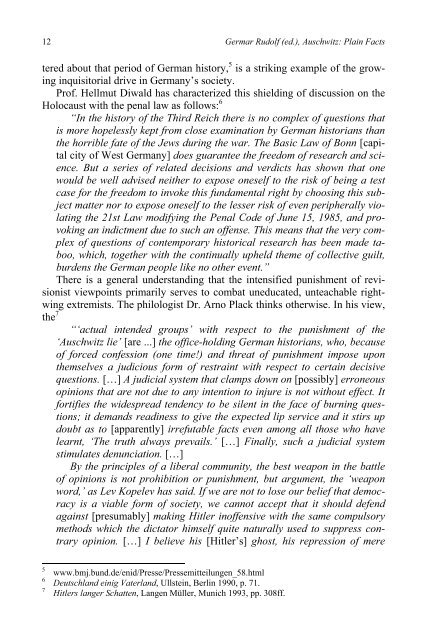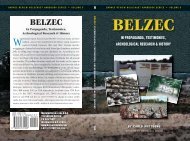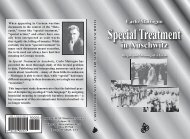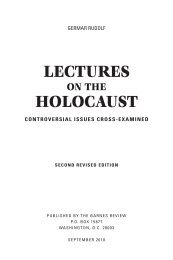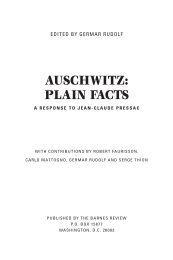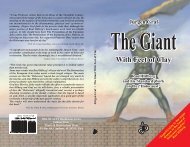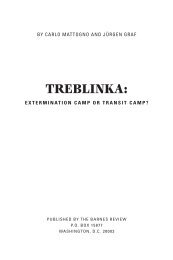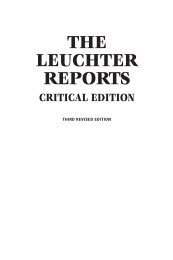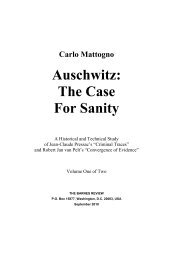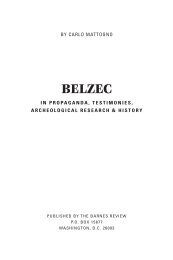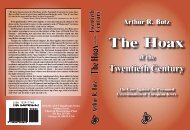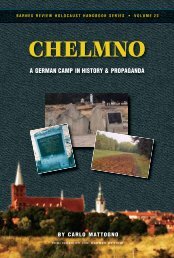AUSCHWITZ: PLAIN FACTS - Holocaust Handbooks
AUSCHWITZ: PLAIN FACTS - Holocaust Handbooks
AUSCHWITZ: PLAIN FACTS - Holocaust Handbooks
You also want an ePaper? Increase the reach of your titles
YUMPU automatically turns print PDFs into web optimized ePapers that Google loves.
12 Germar Rudolf (ed.), Auschwitz: Plain Factstered about that period of German history, 5 is a striking example of the growinginquisitorial drive in Germany’s society.Prof. Hellmut Diwald has characterized this shielding of discussion on the<strong>Holocaust</strong> with the penal law as follows: 6“In the history of the Third Reich there is no complex of questions thatis more hopelessly kept from close examination by German historians thanthe horrible fate of the Jews during the war. The Basic Law of Bonn [capitalcity of West Germany] does guarantee the freedom of research and science.But a series of related decisions and verdicts has shown that onewould be well advised neither to expose oneself to the risk of being a testcase for the freedom to invoke this fundamental right by choosing this subjectmatter nor to expose oneself to the lesser risk of even peripherally violatingthe 21st Law modifying the Penal Code of June 15, 1985, and provokingan indictment due to such an offense. This means that the very complexof questions of contemporary historical research has been made taboo,which, together with the continually upheld theme of collective guilt,burdens the German people like no other event.”There is a general understanding that the intensified punishment of revisionistviewpoints primarily serves to combat uneducated, unteachable rightwingextremists. The philologist Dr. Arno Plack thinks otherwise. In his view,the 7“‘actual intended groups’ with respect to the punishment of the‘Auschwitz lie’ [are ...] the office-holding German historians, who, becauseof forced confession (one time!) and threat of punishment impose uponthemselves a judicious form of restraint with respect to certain decisivequestions. […] A judicial system that clamps down on [possibly] erroneousopinions that are not due to any intention to injure is not without effect. Itfortifies the widespread tendency to be silent in the face of burning questions;it demands readiness to give the expected lip service and it stirs updoubt as to [apparently] irrefutable facts even among all those who havelearnt, ‘The truth always prevails.’ […] Finally, such a judicial systemstimulates denunciation. […]By the principles of a liberal community, the best weapon in the battleof opinions is not prohibition or punishment, but argument, the ‘weaponword,’ as Lev Kopelev has said. If we are not to lose our belief that democracyis a viable form of society, we cannot accept that it should defendagainst [presumably] making Hitler inoffensive with the same compulsorymethods which the dictator himself quite naturally used to suppress contraryopinion. […] I believe his [Hitler’s] ghost, his repression of mere567www.bmj.bund.de/enid/Presse/Pressemitteilungen_58.htmlDeutschland einig Vaterland, Ullstein, Berlin 1990, p. 71.Hitlers langer Schatten, Langen Müller, Munich 1993, pp. 308ff.


